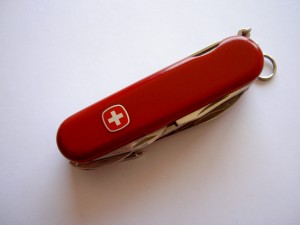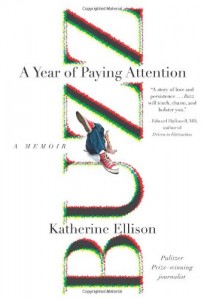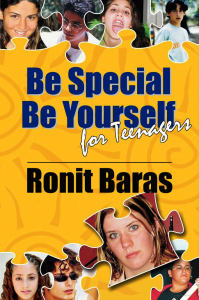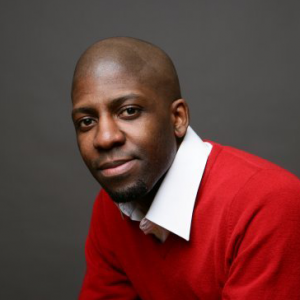|
|
May 4, 2011
by Keith Rispin
Keith “Parenting Old School” Rispin is a parent of 12+ years and a 17 year teaching veteran who specializes in working with at risk youth. It is from this unique perspective along with his own no nonsense upbringing that Keith writes. He believes parenting’s become far too permissive and tries to to shed light on the “absurdity of today’s soft and over indulgent” parenting styles. Whether you agree or not, Keith hopes you’ll find something in his writing to either like, love or even absolutely despise. “It is only through dialog about the differences in our perspectives that we can make the world a better place for ourselves and our children.”
 A tool? A danger? A learning opportunity? All of the above? Ah the Swiss army knife. The ultimate utility tool. Knife, bottle opener, corkscrew, tweezers, screwdriver, pry bar, saw, stick sharpener, bug dissection tool… The list of uses is endless.
I have had one close at hand for as long as I can remember. I was given one as a kid and in my list of life’s big events, I think it ranks in the top 10.
That Swiss Army Knife meant a number of things. Most of which I didn’t realize at the time but recently, I was afforded the opportunity to reflect on just how important that knife was in my growth into adulthood. It was the first stepping stone toward independence, feeling trusted and logical consequence.
Let me explain further. I had a very short conversation the other day with a neighbour about my daughter and her pocket knife.
“Hey Keith, do you realize that your daughter has been using your Swiss Army Knife in the forest?”
“Actually it is her Swiss Army Knife and yes I am quite aware”
“Do you think that is safe?”
“Just as safe as it was when I was twelve”
With that, I got a quizzical look but it got me thinking, what are all the good things that came out of having my very own pocket knife at my disposal when I was a kid?
Independence: Owning a Swiss Army Knife of your own, meant that you didn’t have to ask your dad for his or to have to ask permission to use the household one. You had the freedom to take it out and use it whenever necessary. Believe it or not, I even remember using it in class during Chemistry to fix some piece of science apparatus in about grade 11. Can you imagine doing that today?
Trust: It meant that your parents trusted you to responsibly use this sharp object without doing inappropriate damage to people, places or things. They also trusted that you were responsible enough not to impale yourself… too often.
Logical Consequence: Knives can be very unforgiving. Use it inappropriately or incorrectly and chances are you are going to get cut. Flesh wounds are a great learning experience, especially if they end up with a trip to emergency for stitches.
Nowadays, if you give a kid a knife… It is a cardinal sin. A tool with which a felony is sure to be committed but with that being said, I have given my eldest daughter one anyhow. Actually she has had it for about 2 summers but now she has free reign over its use.
She uses it for everything. It is an essential tool in her outdoor activity and she has been very responsible with it but why do so many parents think that modern day children should hot have access to such benign tools of the childhood experience?
It begs the questions
- Since when are kids incapable of being safe with inherently “dangerous” things?
- How are kids ever going to learn how to handle “dangerous” items if they never get the opportunity?
- If you can’t trust a twelve year old with a pocket knife, at what age can you trust them?
- Why wouldn’t you teach a child how to make sure potentially dangerous things, do not become dangerous?
We are raising social eunuchs, incapable of handling any kind of danger or risk. If we continue to “sterilize” our children’s world in the name of keeping them “safe” then what is the point of living? If we deny our children any rights of passage into adulthood which reach beyond the safety bubble we create for them, they will forever live as children in the eyes of society.
Simple risk activities and items can mean so much in the growth of your child, let them live a little. Even if it means a cut a bruise or an abrasion on occasion it is worth it in your child’s growth into an adult.

November 9, 2010
 "Buzz: A Year of Paying Attention" by Katherine Ellison Today’s guest is Pulitzer Prize-winning investigative journalist Katherine Ellison. A veteran foreign correspondent and writing consultant, Katherine is also the mother of two sons and the author of four books including The Mommy Brain: How Motherhood Makes Us Smarter and her new memoir Buzz: A Year of Paying Attention.
Katherine Ellison gives all she’s got to every professional assignment. (You don’t win a Pulitzer Prize for phoning it in!) One day, she was driving on the freeway, late for a meeting with a new client, when her 12 year old son, Buzz, who’s got ADHD, had yet another major melt-down. Katherine’s 60-mile per hour response was equally over the top. That’s when she decided it was time to put on the brakes, back-burner all other career plans and spend a year paying attention to Buzz and his diagnosis while chronicling her findings and her feelings. In the process she discovered that she too has ADHD (which explained so much about the challenges she’s faced as a journalist and a mom).
Katherine diligently researched and investigated a wide range of ADHD treatments currently available to exhausted, loving parents like herself . For millions of Moms and Dads around the country and abroad who want desperately to help their children with attention deficit disorders find ways to get more control over their behavior so they can be happier and more successful in the classroom and beyond, her book is a welcome and much-needed resource.
If you or someone you care about has a child dealing with ADD/ADHD, you don’t want to miss this interview.
Listen to my conversation with Katherine Ellison right here:
[QUICKTIME http://www.anniefox.com/podcast/FC022.m4a 300 300 false true]
If you have iTunes, you can subscribe to this podcast in the iTunes Store.
Or, you can download an MP3 version here.
Upcoming guests include:
Sean Buvala, author of DaddyTeller: How to be a Hero to Your Kids and Teach Them What’s Really Important By Telling Them One Simple Story at a Time
Dr. Karyn Purvis, co-author (with Dr. David Cross, Wendy Lyons Sunshine) of The Connected Child: Bring hope and healing to your adoptive family
Judith Warner, author of Perfect Madness: Motherhood in the Age of Anxiety and We’ve Got Issues: Children and Parents in the Age of Medication
Rachel Simon, author of Riding The Bus With My Sister and The House on Teacher’s Lane

October 17, 2010
 "Be Special, Be Yourself for Teenagers" by Ronit Baras According to humanistic psychology founder Abraham Maslow we’re all driven by needs. In Maslow’s Hierarchy of Needs, the most basic ones are our physiological needs (air, food, water, sleep, sex, etc.). No surprises there. If you’re consistently not getting what you need in this category, nothing else matters.
After our survival needs are taken care of, then come our need for Safety, Love/Belonging, Esteem, and finally Self-Actualization. It’s all pretty interesting stuff and can be very helpful when you think about human behavior. Most behavior is driven by a need. The most outrageous, over-the-top and often inexplicable behavior is driven by intensely felt emotions tied to these needs. When a kid or a teen acts out, instead of solely addressing what the child is doing, effective parents take a short cut and directly explore the need behind the behavior.
It all sounds like a solid system. Just get your needs met and be happy. Simple. Except what happens when one need is in conflict with another? For example the need for acceptance (which is huge for t(w)eens) vs. the need to be unique, also a big one with middle and high school students. That kind of conflict could spell trouble and often does.
My guest today, Ronit Baras, who has studied and written about these conflicting needs and how they affect the life choices of adults and teens. Ronit is the co-creator of the “Be Happy in LIFE” life coaching program and the author of the two self help books, “Be Special, Be Yourself for Teenagers“ and “In the Outback with Jasmine Banks“.
Ronit is an experienced educator as well as an international speaker. Among her clients are private institutes, schools, universities, public organizations, government bodies, educational associations, financial corporations.
For her community work, Ronit Baras has been nominated twice for “Australian of the Year.”
Listen to our conversation right here:
[QUICKTIME http://www.anniefox.com/podcast/FC021.m4a 300 300 false true]
If you have iTunes, you can subscribe to this podcast in the iTunes Store.
Or, you can download an MP3 version here.
Upcoming guests include:
Katherine Ellison, author of the memoir, Buzz: A Year of Paying Attention
Sean Buvala, author of DaddyTeller: How to be a Hero to Your Kids and Teach Them What’s Really Important By Telling Them One Simple Story at a Time
Dr. Karyn Purvis, co-author (with Dr. David Cross, Wendy Lyons Sunshine) of The Connected Child: Bring hope and healing to your adoptive family
Judith Warner, author of Perfect Madness: Motherhood in the Age of Anxiety and We’ve Got Issues: Children and Parents in the Age of Medication
Rachel Simon, author of Riding The Bus With My Sister and The House on Teacher’s Lane

September 19, 2010
 David McQueen, The Dave Mack Project You don’t need me to tell you the road gets plenty rough during the teen years, for them and for us. 21st century parents frequently miss opportunities to take the lead and maintain meaningful connections with their tweens and teens. Of course, it’s not all our fault. Teens don’t encourage dialogue, at least not with us! But we can only change ourselves and we need to do a better job when it comes to really listening and trying to understand what’s going on with the young people we love most in the world. Because the lessons of intimacy we teach at home help our kids grow into adults with the confidence to discover who they ought to be.
When we miss those opportunities to connect, it’s not because we don’t care, it’s just that all of us (the kids too) are too busy to check in with each other. Sometimes reminders are needed.
My guest today is David McQueen and he’s here to provide some reminders. David is an educator, international speaker, and blogger extraordinaire. He empowers adults and youth alike on subjects such as leadership, careers and communication skills. Dave is also the founder of The Dave Mack Project, a teen empowerment movement that combines speaking, live events, social media and youth coaching for teens and those who work with teens.
For the last 22 years, Dave McQueen has reached over a million teenagers through live speaking and workshops, on TV and online, with messages of empowerment about inhabiting the present and creating a brilliant future.
Listen to our conversation right here:
[QUICKTIME http://www.anniefox.com/podcast/FC020.m4a 300 300 false true]
If you have iTunes, you can subscribe to this podcast in the iTunes Store.
Or, you can download an MP3 version here.
Upcoming guests include:
Ronit Baras, author of Be Special, Be Yourself for Teenagers
Sean Buvala, author of DaddyTeller: How to be a Hero to Your Kids and Teach Them What’s Really Important By Telling Them One Simple Story at a Time
Dr. Karyn Purvis, co-author (with Dr. David Cross, Wendy Lyons Sunshine) of The Connected Child: Bring hope and healing to your adoptive family
Judith Warner, author of Perfect Madness: Motherhood in the Age of Anxiety and We’ve Got Issues: Children and Parents in the Age of Medication
Katherine Ellison, author of the memoir, Buzz: A Year of Paying Attention
 — Older Posts »
| |















